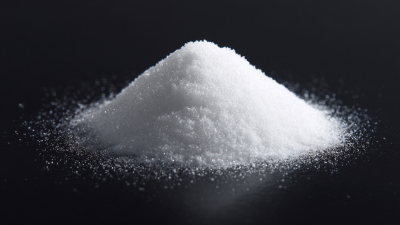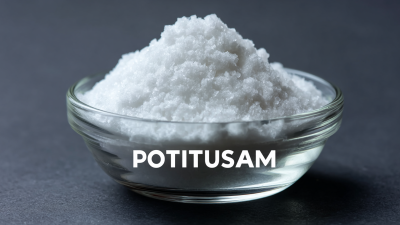In the quest for more sustainable and efficient chemical solutions, industries are increasingly turning to alternatives that not only meet their operational needs but also align with environmental standards. One such solution is Potassium Bisulfate, a versatile compound widely recognized for its role in various applications such as fertilizers, food processing, and water treatment.
 According to a recent market analysis from Grand View Research, the global potassium bisulfate market is projected to reach USD 270.1 million by 2025, reflecting a compound annual growth rate (CAGR) of 4.3%. This growth is driven by its effectiveness as a soil conditioner in agriculture and its application in manufacturing amphoteric surfactants. This blog aims to explore the multifaceted applications of Potassium Bisulfate in different industries, highlighting its benefits and providing practical guidance on how to integrate this alternative chemical solution into existing processes.
According to a recent market analysis from Grand View Research, the global potassium bisulfate market is projected to reach USD 270.1 million by 2025, reflecting a compound annual growth rate (CAGR) of 4.3%. This growth is driven by its effectiveness as a soil conditioner in agriculture and its application in manufacturing amphoteric surfactants. This blog aims to explore the multifaceted applications of Potassium Bisulfate in different industries, highlighting its benefits and providing practical guidance on how to integrate this alternative chemical solution into existing processes.
Potassium bisulfate, a versatile chemical compound, plays a critical role in various industries, showcasing its importance across multiple applications. In the food industry, it serves as a safe and effective preservative. According to a report by the Food and Drug Administration (FDA), potassium bisulfate is approved for use in food processing, particularly in preserving the color and freshness of processed fruits and vegetables, thus enhancing product shelf-life. Its ability to inhibit microbial growth makes it indispensable in extending the viability of perishable goods.
In the agricultural sector, potassium bisulfate acts as an essential ingredient in fertilizers. A report from the International Fertilizer Industry Association (IFA) highlighted that potassium bisulfate contributes significantly to soil health and plant growth by providing vital potassium nutrients. Its application not only aids in nutrient absorption but also improves crop yield and quality. Furthermore, its role in sustainable agriculture cannot be understated, as it promotes eco-friendly farming practices by reducing the need for harsher chemical alternatives, making it an invaluable asset in modern farming methodologies.
Potassium bisulfate (KHSO4) is an important chemical compound with a unique set of properties that make it valuable in various industrial applications. This white crystalline solid is highly soluble in water and acts as an acidic salt, which contributes to its multifunctionality. Its ability to release sulfuric acid when dissolved in water enables it to serve as a pH adjuster in processes such as food preservation, where maintaining a specific acidity level is crucial. Additionally, its low toxicity profile and compatibility with organic compounds enhance its appeal for use in the food and beverage industry.
In the realm of manufacturing, potassium bisulfate plays a pivotal role in numerous synthesis reactions. It can act as a catalyst, aiding in the production of chemicals and fertilizers. Furthermore, its applications extend to the glass and ceramics industries, where it is utilized as a refining agent to improve product quality. The compound's thermal stability also makes it suitable for various high-temperature processes, ensuring efficiency and safety. As industries seek greener and more sustainable chemical solutions, potassium bisulfate stands out for its versatility and effectiveness, highlighting the significance of exploring alternative chemical agents in industrial practices.
In recent years, industries have been actively seeking alternative chemical solutions to enhance efficiency and reduce environmental impact. Potassium bisulfate has emerged as a compelling contender compared to traditional chemical agents. This compound offers a range of advantages, particularly in its dual role as a buffering agent and a source of potassium in various applications, including fertilizers and food processing. Unlike some conventional chemicals that can be harsh and reactive, potassium bisulfate is generally regarded as safer, making it an appealing option for industries aiming to improve their sustainability practices.
A comparative analysis reveals that potassium bisulfate not only disrupts fewer ecosystems but also mitigates the risk of hazardous waste. Traditional chemicals often require stringent handling and safety measures due to their corrosive nature. In contrast, potassium bisulfate’s lower toxicity and ease of use streamline processes, reducing the operational costs associated with safety protocols and waste disposal. This shift towards potassium bisulfate signifies a broader trend towards environmentally friendly practices while maintaining product efficacy, showcasing its potential to reshape industrial chemical applications.
Potassium bisulfate (KHSO4) is emerging as a sustainable alternative in various industrial applications, presenting a range of environmental benefits. As industries are increasingly pressured to reduce their ecological footprints, potassium bisulfate has gained attention for its role in processes such as wastewater treatment and as an acidulant in food production. According to a report by the American Chemical Society, switching to potassium bisulfate in these applications can reduce toxic byproduct formation by up to 30%, which significantly lessens the impact on local ecosystems and waterways.
Furthermore, potassium bisulfate's effectiveness as a pH adjuster in soil treatment systems can enhance agricultural sustainability. The United Nations Food and Agriculture Organization (FAO) has noted that its use can improve soil health by optimizing nutrient availability, ultimately leading to higher crop yields without the adverse effects associated with synthetic fertilizers. By replacing harsher chemicals with potassium bisulfate, industries not only comply with stricter environmental regulations but also contribute to a circular economy that prioritizes ecological balance and resource conservation.
The application of potassium bisulfate in manufacturing processes is experiencing a significant transformation as industries seek more sustainable and efficient solutions. Traditionally utilized for its acidic properties and as a food preservative, potassium bisulfate is being re-evaluated for its potential in various chemical processes. Future innovations are leaning towards optimizing this compound's role in catalyzing reactions, particularly in the production of pharmaceuticals and fine chemicals. The ability to minimize waste and enhance purity levels in chemical reactions positions potassium bisulfate as a key player in modern manufacturing.
Emerging trends indicate a growing interest in integrating potassium bisulfate into greener chemistry practices. As regulatory pressures increase and demand for environmentally-friendly products rises, manufacturers are looking for alternatives that not only meet performance requirements but also align with sustainability goals. Advances in technology and research are unlocking new applications of potassium bisulfate, allowing manufacturers to reproduce reactions that once relied on harsher chemicals. This shift not only aids in reducing the ecological footprint of production processes but also fosters a new wave of innovation within the chemical industry, making potassium bisulfate a compound to watch in the future.
| Application Area | Current Usage | Innovative Trends | Potential Benefits |
|---|---|---|---|
| Food Industry | pH Control, Preservative | Natural Ingredient Substitutes | Enhanced Safety, Shelf Life |
| Agriculture | Soil Amendment, Fertilizer | Sustainable Farming Practices | Improved Crop Yield, Reduced Chemicals |
| Chemical Manufacturing | Intermediate in Synthesis | Green Chemistry Initiatives | Lowered Toxicity, Eco-Friendly Production |
| Pharmaceuticals | Buffering Agent | Biocompatible Formulations | Enhanced Efficacy, Reduced Side Effects |
| Cosmetics | pH Adjuster, Preservative | Natural-Based Formulations | Increased Consumer Confidence, Safety |






